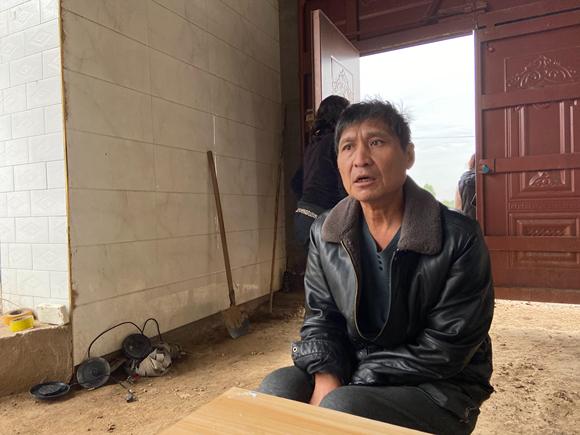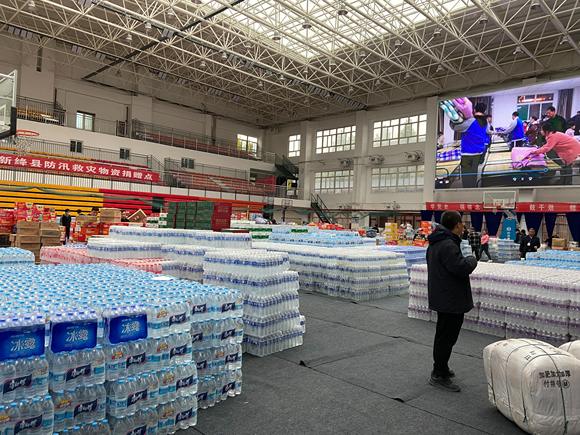The 20-meter breach of the levee caused by floods was closed within 24 hours, but it would take much longer to turn the small county of Xinjiang back what it once was.

The Fanhe levee is breached in Duanjiazhuang village. Photo from CFP
By ZHAI Xingli
The end of September is harvest time for corn and yam in Shanxi Province, but this year, nearly a month of rain has left cornfields knee-deep with water and mud. The level of the Fenhe River in Xinjiang, a small county in southwest Shanxi, continues to rise.
In September, 302 millimeters of rain caused widespread damage in a province accustomed to about 70 millimeters at that time of year. When the river burst its banks on October 7, more than 300 professional rescuer workers and 100 vehicles helped evacuate nearly 20,000 people but the worst may be yet to come.
The 20-meter breach was filled within 24 hours, but cleaning up the mess will take much longer. The levels of Fenhe and its tributary Huihe are still very high. There is severe waterlogging in many areas and accumulations of mud and garbage. Houses are damaged and people are waiting for permission to return home.

The Fenhe River is the biggest river in Shanxi, a province about the size of California. And like California, the Fenhe Basin usually suffers from droughts rather than floods. The river often runs dry at this time of year. This year, local people were totally unprepared when heavy rainfall hit.
HOU Sanhong, a farmer who lives on the Fenhe riverbank, had never seen rain like it. Most of his corn was destroyed by wind and rain. What survived rotted in the fields where Hou had to harvest what there was by hand, alone. Hou’s yams, the main local cash crop, and which cost him 180,000 yuan (US$28,000) to bring to this stage, were rotting in the ground.
Hou’s house is located less than 500 meters away from the confluence of the Huihe flows and Fenhe rivers. When the water started to spill out of manhole covers in the village, it was clear that the drainage system could no longer handle the situation and water started to accumulate in low-lying areas. When Hou saw the water rising he began organizing a team to reinforce the embankment. The whole village joined in filling feed sacks with soil and building up the barricade. That night officials from nearby villages came to Hou's home. They congratulated themselves on a disaster averted. Everyone felt much safer.

Meanwhile, in nearby Duanjiazhuang Village, things were getting worse. Someone noticed that the soil around a drain was washing away little by little. By the time anyone with authority arrived on the scene, 20 meters of the bank had been washed away.
“The dike was not built from stone, but soil. The soil was saturated and when water continued to rush down, there was nowhere for it to go except to flood in town,” said a local rescuer.
On October 7 the Fenhe’s peak flow was 30 times the daily flow norm. Villagers and soldiers struggling with bags were never going to be a match for raging nature, so the decision was taken to abandon the embankment and evacuate.
“The whole county was in great danger. Nobody knew how much worse things would get.” the volunteer said.
Shanxi Department of Water Resources sent two bulldozers onto the bank, but they could do little. The whole operation came down to one elderly expert, alone on the embankment with a walkie-talkie, bravely directing a crane driver to fill the breach with rubble. At about 4pm on October 8, the breach was closed.
When the order came to evacuate all residents, Wang Ying'ao, the party secretary of Nanguan Village, already had water up to his knees. It took Wang more time than he thought to persuade some 50 stubborn villagers to evacuate. When they finally agreed to leave, the water on the streets was reaching their chests. Wang had to call in two bulldozers and the villagers were carried out in the tipping-hoppers of the machines.
Elsewhere, Bai Huizhen, village party secretary of Xiguan, encountered a different problem, when she counted the evacuated villagers, she found one person missing. More worryingly still, the missing villager in question had a medical condition that required some special attention.
The last person who saw her was a woman who sold oranges in the village. Before evacuating, the vendor saw her on the street and gave her some oranges. Bai led a search team back to the swamped village to look for the missing woman but found nothing, so they had no choice but to check all 14 temporary resettlement sites in the county. Finding one person among the 17,631 who had been evacuated proved impossible. Then someone suggested sending a female to call her name because the woman in question avoided men whenever possible.
Many flood control personnel had not returned home for days, but soon, four very tall men returned to the village – the water was chest-high by now – with one female officer on their shoulders.
The missing woman was eventually found in a locked factory. Volunteers had gone there several times before. Afraid to respond, she had survived for two days on the oranges.
On October 10, villagers wanted to go home. The over-stretched rescue teams had numerous competing priorities and were in an awkward situation. Not wanting to disappoint the villagers, residents were instructed in how to check the water flow for themselves, and what to do if the situation worsened again.

“We cannot please everyone, but we do understand their desire to return home as soon as possible,” the rescue leader said. However, villagers’ concerns haven’t been completely alleviated. For people who lost their homes – some were evacuated twice – it was difficult to be positive.
In Xinjiang middle school where it was used as a temporary accommodation for evacuees, over one thousand students were organized to prepare a performance for the villagers in the evening. As the students sang, the displaced villagers climbed onto their beds, or stood in the gym, bellowing out the choruses. Everything was going to be alright.